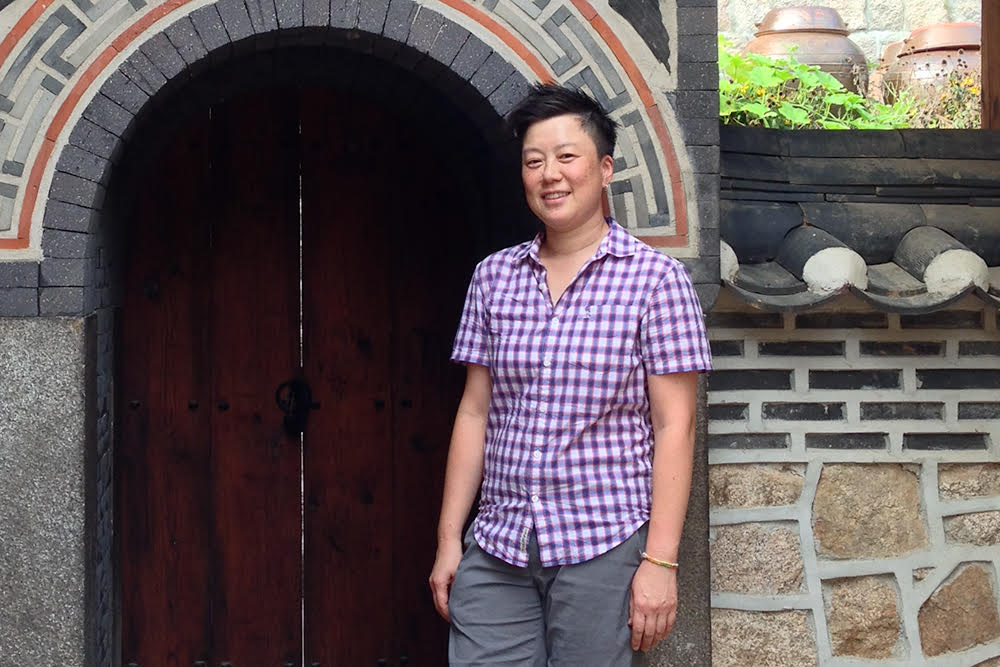
Courtesy of Ju Hui Judy Han.
Ju Hui Judy Han is an assistant professor in gender studies at the University of California, Los Angeles. An interdisciplinary cultural geographer, she is interested in religion, mobilities, and difference. Before taking part in the panel discussion for “How Have Women’s Protests Changed History?,” the first of a three-event Zócalo/Natural History Museum of Los Angeles County series, she stopped by the green room to talk about her lifelong love of comic books, how L.A.’s multilingual culture fills her with curiosity and humility, and why the best piece of advice she ever received was to get a dog.
How did you get into trouble when you were a kid?
I went to elementary school in Korea. Ordinarily, I was a total rule abider. But I surprised my teachers because I would do these pranks. So, in second grade, it must have been for April Fool’s, I convinced the whole class, which was 65 students, to turn their chairs around. I can imagine why the teacher was pissed when she came in. We ended up having to do bunny hops around the school yard as punishment.
What’s your favorite thing about Los Angeles?
I like the multilingual space that living in L.A. forces you to get used to. Unless you’re some sort of polyglot who speaks a bunch of languages, living in L.A. you actually don’t understand a lot of things that you see or hear, whether it’s signage or conversations. Of course, a language gap is not always a good thing, and that’s often part of the multilingual experience people focus on, but also, I think it’s an interesting challenge, where you have to learn to communicate with people where there’s very little shared in common. I find that to be very exhilarating. When I think about L.A., that’s what I think about: fractured glimpses of interesting lives.
What do you do to decompress?
Dog parks. I don’t like dog parks the way some people like dog parks, to socialize with other humans. I just want to let the dog off leash, have my hands free, and just watch how adorable and interesting and amazing dogs are. If I could do that for a half hour every day, I’d be a very happy human being.
I have two dogs. One’s name is Koga. I got him when my partner and I were living in Korea for a year in 2016. He’s from a remote island off the coast of Korea, where a veterinarian was found to have rounded up street dogs and performed all these unneeded surgeries on these poor dogs. I met him in Seoul after he was rescued. He’s kind of mysterious looking. He’s small, but he looks like a red fox or something. We did a DNA test, and it turns out he’s half miniature schnauzer and half what the DNA people called “East Asian village dog,” which is basically so many breeds that they can’t even call it a breed. So, he’s some sort of a super mutt. Aji is also a rescue; she’s from the humane society in Pomona. The two are totally bonded.
What’s the best advice you ever received?
Actually, to get a dog. It was from Elaine Kim at UC Berkeley. She taught ethnic studies for a long time and retired a few years ago. I knew her as an undergraduate student. I took seven years off after college before starting grad school. I was back in Berkeley again, so I was back in touch with her. And she said: get a dog. Dogs force you to go outside more, and play, and it’ll be great for your health overall. I’ve always loved dogs so it’s not like that was a new idea that she planted, but I think in some ways that’s what good advice is: it actually tells you something you maybe already know, but it’s the timing and the way they say it that you’re most likely to accept it. That’s how I got Puca, a sweet lab mix who passed away in 2016 after 14 years with me.
What are you reading right now?
I just got a shipment yesterday of three comic books from Drawn and Quarterly, a comic book publisher. One is called Moms by Yeong-shin Ma, which is about Korean moms. The second one is Year of the Rabbit by Tian Veasna, about the Khmer Rouge and the deaths and suffering that follow, and the third one is Showa 1926-1939: A History of Japan by Shigeru Mizuki.
I probably started reading comics as soon as I started reading. Comics were so common in Korea. I grew up surrounded by hundreds of different story lines unfolding. The comic books were the size of phone books. I don’t think I paid attention to where one began and one ended; in some ways, it just all blended in together, an assemblage of stories.



